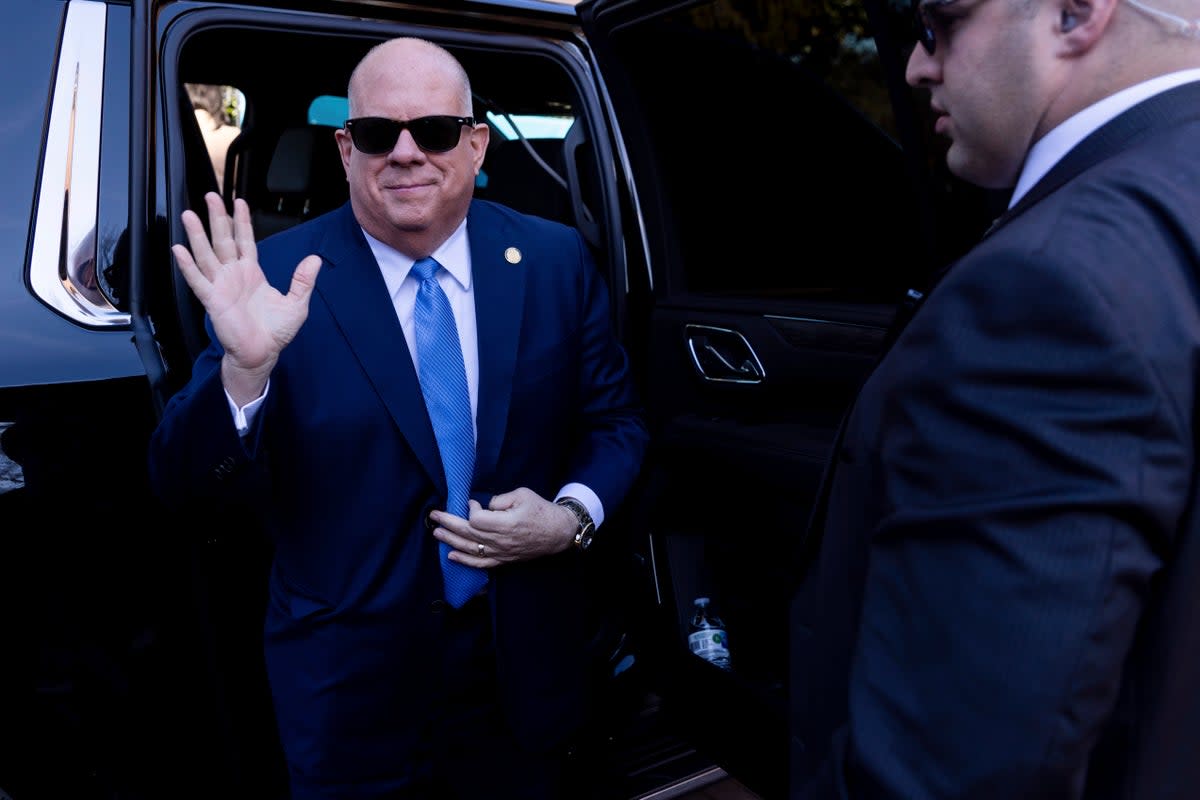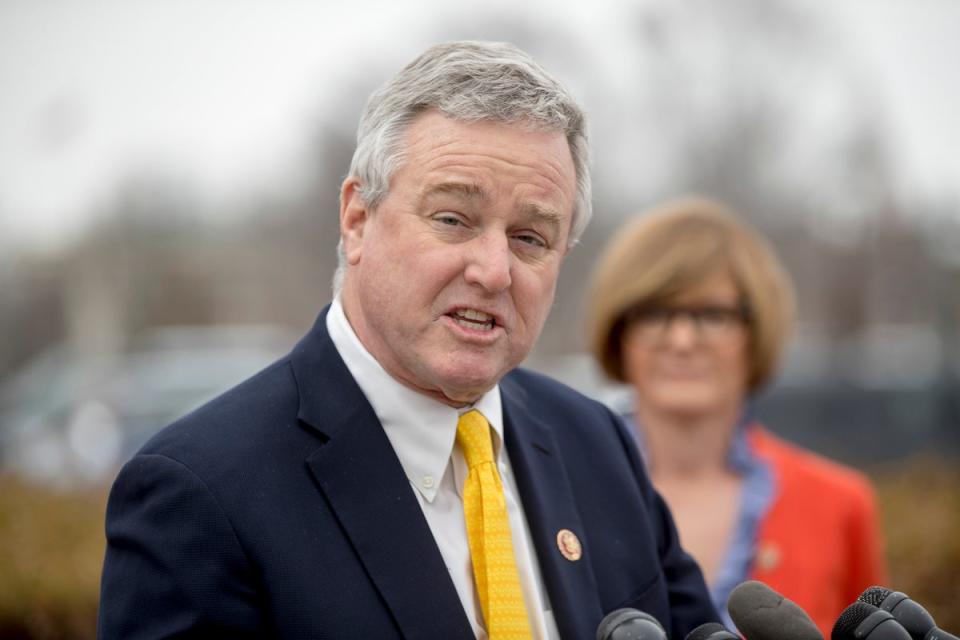The anti-Trump showdown being set up by a Senate primary in Maryland

Democrats and Republicans will select their respective nominees for the US Senate in Maryland on Tuesday and in doing so will set up the most unique race of the cycle.
Two leading Democrats, Congressman David Trone and Prince George’s County Executive Angela Alsobrooks, are locked in a dead heat as the race enters its final hours.
The Democratic primary, which has grown negative in the past few weeks, carries incredible significance: the entrance of former Governor Larry Hogan into the race has given Republicans a breath of life and possibly their only real shot at winning the seat.
That dynamic is playing out in a year when Democrats hold the Senate by one vote and are looking desperately to protect that majority either for the start of a second Biden term or to throttle Donald Trump’s first two years in office.
Senate races in Maryland are not usually competitive; the state is reliably blue in terms of its congressional delegation. But Mr Hogan’s two terms in office left him with widespread name recognition and a reputation bolstered by beating cancer while in office.
His centrist record — including his signature on a bill banning fracking and his support for the Paris climate agreement — helped him distinguish himself as an outlier within the Republican Party even as he frequently picked fights with Democrats in the state legislature, who were forced to override his vetoes.
Mr Trone, a member of the House, is pursuing a strategy that may seem surprising unless one is already familiar with the Total Wine & More mogul. Owner of the prolific beverage megamart chain, Mr Trone has poured more than $61m of his own money into this race, making it the most expensive Democratic Senate primary in state history. That would be surprising, had he not done the same in his two bids for the House, once in a losing battle against Jamie Raskin (which fostered bad blood that still persists) and once again in a crowded 2018 primary (ditto).

Ms Alsobrooks is taking a more familiar route. She declined an opportunity to run for governor in 2022, as Hogan’s second term came to a close. The Prince George’s County Executive was then promptly endorsed by the winner of that contest, Democrat Wes Moore, and a host of his allies across the state. Unable to match Mr Trone’s injections of his own personal wealth, she has leaned harder on statewide connections while attacking Mr Trone for missteps including his unintentional utterance of a racial slur at a House hearing.
There’s one other important factor which singles out Mr Hogan from his Republican colleagues: his clear, firm opposition to Donald Trump. Hogan was one of just a few prominent elected Republicans to support the impeachment of the 45th president after January 6, and came out in favour of the first Trump impeachment inquiry in 2019 as well.
In campaigning for the seat in 2024, he has positioned himself as an enemy of “dysfunction” in Washington and a Mitt Romney- or Lisa Murkowski-esque check on a possible President Donald Trump from within the Republican Party, though he rarely mentions the former president on the trail. His campaign website pointedly alerts viewers to the fact that his father was the only Republican to support the impeachment of Richard Nixon in the Senate in 1974.
All that being said, Mr Hogan’s greatest advantage over Mr Trone and Ms Alsobrooks is his name recognition. A poll in March found that a much wider quantity of voters had no opinion of the Democratic contenders compared to the likely Republican nominee. A poll taken in the final few days of the race contradicted some concerns about either Democratic candidate’s ability to beat Mr Hogan in November, though how voters feel may be another story.
One dynamic is playing firmly against Mr Hogan this time around: the realities of his sought office. Having served as the chief executive of a state and not a legislator, Mr Hogan’s reputation is built on being a stand-alone operative. That’s harder to do in the Senate, where despite his anti-Trump rhetoric he will inevitably end up caucusing with the GOP.
The reality of the situation is that the former governor was recruited by Republicans to run for this seat because he was the party’s best chance of winning it and flipping the upper chamber — and voters know this. Some Marylanders who were featured this past week on The Bulwark’s Focus Group podcast with Sarah Longwell described themselves as Hogan-Biden voters and explained that keeping the seat in Democratic hands was too important, regardless of Mr Hogan’s record.
“After I’ve seen what the Republicans have done with the House and the Senate...I think we need to keep that seat,” one woman explained of her view.

There’s the catch. In seeking to join a GOP caucus in the Senate, Mr Hogan is inadvertently tying himself to all the baggage that comes with that new club. In his case, that may include not just the Senate, where bipartisanship has carried on in a beleaguered sense, but the House of Representatives as well.
The lower chamber and the Republican House caucus specifically remain a chaotic scene, with members feuding openly in the media, endorsing against each other in GOP primaries, and deriding each other with petty insults. Just this past week, Georgia Republican Marjorie Taylor Greene and two of her colleagues brought a motion to oust a speaker of the House, the second such motion to reach the floor within the past 12 months. In a surreal scene, she angrily rebuked the “uniparty” as both Democrats and Republicans joined in booing her on the floor.
Donald Trump will also play a role directly. This will be the first time, thanks to the timing of Maryland’s statewide elections, that Mr Hogan and the former president will be on the ballot in the same year. That’s another factor that could weigh on Mr Hogan; in a deep blue state, he will be under increased pressure to distance himself from the top of his party’s ticket as the election draws closer.
Whatever the outcome tomorrow, the Maryland race is set to be one of the most unique in the country in 2024. Two candidates are testing dramatically different strategies for gaining political power, even as they themselves differ only marginally in policy. The race it sets up in November will answer a bigger question: is the #NeverTrump faction of the Republican Party still a viable political force?

 Yahoo News
Yahoo News 
